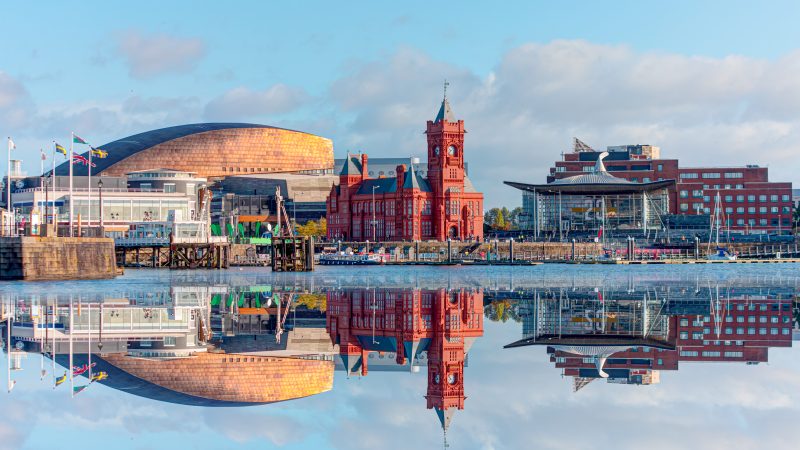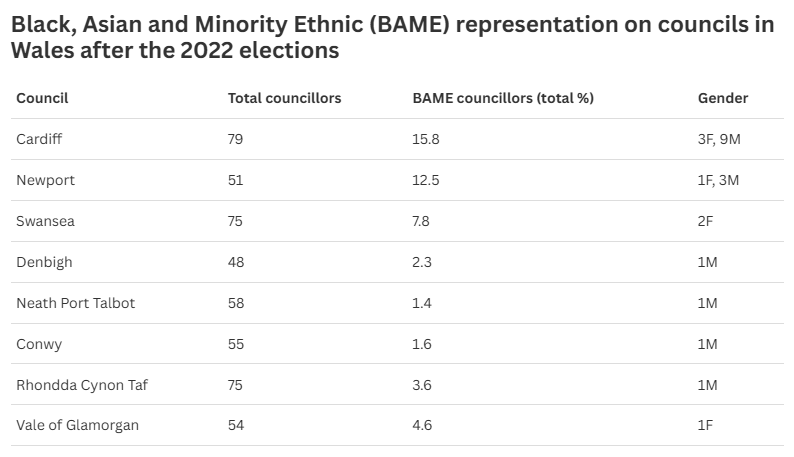
Black, Asian, and Ethnic Minority (BAME) individuals are glaringly underrepresented in Welsh politics, especially when compared to their counterparts just across the Prince of Wales Bridge in England.
Analysis of the population census data from 2011 and 2021 shows an increase in the percentage of residents in Wales who identify as Black, Black Welsh, Black British, Caribbean, or African, rising from 0.6 percent in 2011 to 0.9 percent in 2021. This data underscores the urgent need for the voices of the growing BAME population in Wales to be included in decision-making processes if we are to achieve the goals outlined in the Anti-racist Wales Action Plan.
The systemic barriers to ethnic minority representation in politics are substantial, with Black women facing particularly severe obstacles. A colleague leveraged his academic expertise to conduct a preliminary review of council websites that showcased photos (excluding Blaenau Gwent). While his findings may not be exhaustive and are subject to verification or correction by relevant organizations or individuals, they starkly highlight the dismal state of representation in Wales, which we must urgently address.

READ MORE: ‘Reform’s spectre looms over Welsh Labour. But we can stop their advance’
‘I had to campaign three times more than my counterparts’
My journey to becoming the second elected Black female Councillor in the history of Swansea highlights the challenges that BAME (Black, Asian, and Minority Ethnic) candidates face in politics. One of the biggest challenges is convincing the predominantly white local population to vote for you.
In my case, I found that I had to campaign three times more than my counterparts. This was not only because I was a new candidate meeting residents for the first time but also due to a preconceived notion that I needed to prove my capabilities to the local white community.
Some unsuccessful candidates have shared their experiences of encountering racism at the doors, as well as facing both overt and covert bias during the selection process. Additionally, there are significant hurdles, such as the lack of access to public funds, which complicates the lives of eligible candidates who must balance work and family care without support. There is also an insufficiency of mentoring and training opportunities to enhance political knowledge, and a lack of recognition from the wider UK public that ethnic minorities have a legitimate stake in the country’s politics, among other challenges.
READ MORE: Eluned Morgan on the new Senedd voting system and ‘moving on’ from Welsh Labour rifts
‘Our voices in key areas of government are important’
My experiences with various challenges have made me realize that encouraging Black women to join politics in Wales can be difficult. The expectation of putting in extra effort often discourages them. Sharing my own story—navigating the complexities of being a Black woman, a single mother, and living on a single income without access to public funds—doesn’t always inspire others to step forward.
To address this, I not only share my journey to inspire other Black women but also actively seek mentoring opportunities to advocate for the need for more Black women in politics. I emphasize the importance of our voices in key areas of government, such as addressing health disparities that disproportionately affect Black women during childbirth and the need for representation in policy-making and decision-making processes.
For more from LabourList, follow us on Bluesky, Threads, X, Facebook, Instagram or WhatsApp.
Following Vaughn Gething’s experience in Wales, the Labour BAME Committee urges the Party to enhance its commitment to supporting racial diversity in the Welsh Assembly elections 2026 by eliminating all forms of discrimination and barriers for BAME candidates.
While it is a privilege to participate in campaigns like the Diverse 50:50 Women’s Equality Network of Wales campaign and the Charter for Women to support more women getting elected to the Senedd with the new reform, it is essential to address the specific challenges Black women face.
Kimberly Crenshaw’s concept of Intersectionality highlights this issue, illustrating how initiatives aimed at combating racism often benefit Black men, while those focused on gender predominantly support white women.
Therefore, it is crucial for women in elected positions, like myself, to work closely with our allies. We must ensure that efforts to increase women’s representation in politics also include vital interventions, such as mentoring and training specifically targeted at Black women.
SIGN UP: Get the best daily roundup and analysis of Labour news and comment in our newsletter
- SHARE: If you have anything to share that we should be looking into or publishing about this story – or any other topic involving Labour– contact us (strictly anonymously if you wish) at [email protected].
- SUBSCRIBE: Sign up to LabourList’s morning email here for the best briefing on everything Labour, every weekday morning.
- DONATE: If you value our work, please donate to become one of our supporters here and help sustain and expand our coverage.
- PARTNER: If you or your organisation might be interested in partnering with us on sponsored events or content, email [email protected].




More from LabourList
Paul Nowak column: ‘Labour must focus on the basics’
‘Labour’s two-child cap victory rings hollow while asylum-seeking children remain in poverty’
SPONSORED: ‘Unlocking pension power to boost the UK’s fortunes’